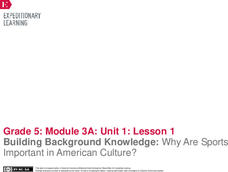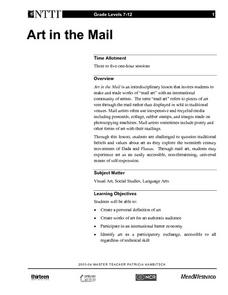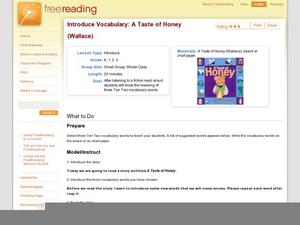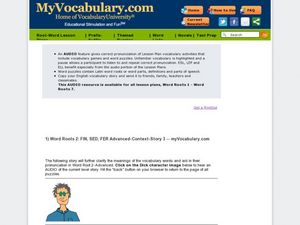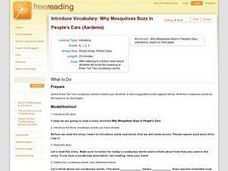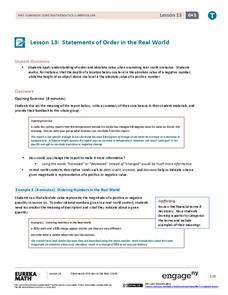Curated OER
Quick and Sticky Context Clues
Discuss strategies for defining word your young readers don't know. They read sentences with key words covered by sticky notes and guess from the context what the word might be. They peek at the first letter and guess again.
EngageNY
Building Background Knowledge: Why Are Sports Important in American Culture?
What makes sports so special to many Americans? Scholars ponder the question as they participate in a gallery walk, immersing themselves in images and texts about sports. Pupils also complete a vocabulary strategies anchor chart to...
Curated OER
Art in the Mail
The "mail art" phenomena was started back in the 20's with the Dada and Fluxus art movements and revitalized in the 60's. The principle of mail art, is free exchange and artistic expression. Learners study these facts and then create...
Curated OER
The Catcher in the Rye: Vocabulary Self-Collection Strategy
Group members select a word from The Catcher in the Rye they would like the class to know more about. After identifying the context and determining the meaning of the word from the context, they present the word to the entire class,...
Curated OER
Introduce Vocabulary: I Hate To Be Sick
Engaged in a read aloud, kids use the story to define new vocabulary words, raising their hands when they hear new words in the story. Additionally, individuals refer to the text to show how the word was used in context. Vocabulary words...
Curated OER
Introduce Vocabulary: A Taste of Honey (Wallace)
A Taste of Honey offers learners a chance to practice with unknown words and context clues. Choose several vocabulary words to focus on as you read the picture book, or use the ones provided here. Pre-teach the words and have scholars...
Curated OER
Latin Roots fin, sed, fer: Context Story (Advanced)
Several vocabulary words are joined together in a cohesive paragraph that can be played via audio clip for your class. Pauses in the audio allow listeners to repeat the target words to emphasize correct pronunciation. As the audio is...
Curated OER
Guided Reading Organizer for Chain Reaction
The class uses Chain Reaction, a magazine, to build a better understanding of Latin and Greek roots found in scientific vocabulary. They use two attached worksheets to help them read a scientific article, using visual clues and their...
Achieve3000
Context Clues and Idioms
Kids practice using five types of context clues (definition, synonym, antonym, example, and general) to decode idiomatic language.
EngageNY
Establishing Routines for Discussing A Long Walk to Water (Chapter 6)
Middle schoolers use a reader's dictionary to locate words they do not know in chapter 6 of A Long Walk to Water. They then turn attention to gist and work on a Salva/Nya anchor chart to record what happens to the characters. Finally,...
Curated OER
The First (and Last) Words
What does "freedom of speech" mean to your class, especially in the context of Internet communications? In round-table discussion format, middle and high schoolers address the issues discussed in "State Legislatures Across U.S. Plan to...
Curated OER
Strategies for Determining the Meaning of a Word
What does that word mean? I can sound it out, but it just doesn't make sense. Teach your class a sure fire strategy to combat those pesky unknown words. You'll introduce the concept of context clues through metacognitive modeling,...
Curated OER
Introduce Vocabulary: Why Mosquitos Buzz in People's Ears
Students determine the meaning of tier two vocabulary words. In this vocabulary lesson, students read Why Mosquitos Buzz in People's Ears and explore new vocabulary words found in the story. Students record their discoveries in a word...
Curated OER
Context Clues, Plot Structure, Conflict, and Personal Narrative Essay
What are the elements of a personal narrative? Get your class talking by reading "The Necklace" and "A Dangerous Game." The lesson focuses primarily on defining certain vocabulary terms (like context clues, plot, conflict, climax, etc.)...
Curated OER
Vocabulary: Make Connections with New Vocabulary
The story Hansel and Gretel is used to build new vocabulary in context. The class reads the story together. They then focus on 2-3 new vocabulary words, using the context of the story to help define them. This lesson is fully scripted...
Curated OER
Vocabulary Building
Use primary text documents to learn word roots. Learners listen to a reading of the Declaration of Independence and highlight words they don't know. They compile these words and guess their meanings. They discuss roots, prefixes,...
Scholastic
Frindle Lesson Plan
"Who says a pen has to be called a pen? Why not call it a frindle?" Inspired by this quote from the award-winning novel written by Andrew Celements, this lesson allows children to invent their own terms for common classroom objects,...
Novelinks
The Little Prince: Brainstorming Activity
What do you think of when you hear the word adult? Or friend? Learners brainstorm with a group of peers to list the words they think of when they hear seven words from Antoine de Saint-Exupéry's The Little Prince.
Curated OER
Pendemonium: The Italian Job
Discover how to use prefixes and suffixes to determine the meaning of unfamiliar words. The group views a jovial video on the topic, and then they create a chart of prefix and suffix meanings to identify the meanings of words in a social...
Illinois Mathematics and Science Academy
A Search for Symbolism in The Great Gatsby
After reading The Great Gatsby, groups return to the text and note passages where Fitzgerald uses symbols and color imagery in his narrative. They then develop a presentation that explains the context, the implications, and possible...
EngageNY
Statements of Order in the Real World
Positive and negative numbers are all around us. Groups read short story contexts and identify a rational number that represents the values in the context. They order the rational numbers and interpret statements of inequality.
Illustrative Mathematics
How Many Containers in One Cup / Cups in One Container?
The object is to model fraction division by asking “How many are in one group?” It is a difficult concept to understand, but developing the model that shows one cup to a certain amount of container or one container to a certain amount of...
Center for Civic Education
Martin Luther King Jr. and the Power of Words
It is easy to forget the power that written or spoken word can have in effecting change. Using quotations from such inspirational leaders as Maya Angelou, Mahatma Gandhi, and Martin Luther King Jr., encourage your class members to...
Hyperion Publishing
Words We Live By: Your Annotated Guide to the Constitution
The language of the Constitution can feel quite ominous to young learners, but there are a variety of strategies you can utilize to help your class grasp the important concepts and ideals in our nation's founding document. This lesson...



